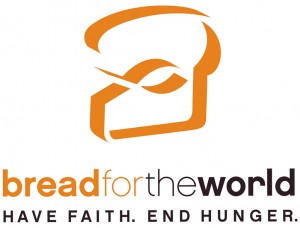 We of Hope Church are a Bread for the World covenant church. Bread for the World is a collective Christian voice, moved by God’s grace in Jesus Christ, urging our nation’s decision makers to end hunger at home and abroad. Our faithful advocacy makes a difference. Last year, we held off dramatic cuts to domestic anti-hunger programs, such as SNAP (Supplemental Nutrition Assistance Program) and WIC (Women, Infants, and Children), and prevented extreme cuts to emergency international humanitarian assistance. In fact, our letters and those from churches and other groups helped win an additional $1 billion in funding to address the near-famine crises that arose in several countries in Africa and the Middle East. Yet, far too many of our neighbors continue to struggle to buy nutritious food and secure jobs with livable wages.
We of Hope Church are a Bread for the World covenant church. Bread for the World is a collective Christian voice, moved by God’s grace in Jesus Christ, urging our nation’s decision makers to end hunger at home and abroad. Our faithful advocacy makes a difference. Last year, we held off dramatic cuts to domestic anti-hunger programs, such as SNAP (Supplemental Nutrition Assistance Program) and WIC (Women, Infants, and Children), and prevented extreme cuts to emergency international humanitarian assistance. In fact, our letters and those from churches and other groups helped win an additional $1 billion in funding to address the near-famine crises that arose in several countries in Africa and the Middle East. Yet, far too many of our neighbors continue to struggle to buy nutritious food and secure jobs with livable wages.
- More than 41 million Americans, including 13 million children, lived in households that struggled to put food on the table in 2016. African Americans, Latinos, and Native Americans were approximately twice as likely as the overall population to live at risk of hunger.
- More than 40 million Americans lived below the poverty line in 2016; 1 in 3 were children.
- SNAP moved an estimated 3.6 million people out of poverty in 2016.
- About two-thirds of SNAP recipients are children, elderly, or disabled.
- In 2016, more than 7.6 million low-income women and young children retrieved nutritious food and nutrition education through the WIC program.
- The earned income tax credit and the refundable portion of the child tax credit moved 8.2 million people out of poverty in 2016, including 4.8 million children.
- The percentage of U.S. residents with health insurance rose to 91.2 percent in 2016. However, the uninsured rate for the poorest Americans is still 13.7 percent.
- In 2016, states that expanded Medicaid had an average uninsured rate of 6.5 percent, while states that did not expand Medicaid faired much worse with an average uninsured rate of 11.7 percent.
- Worldwide, extreme poverty rates have been cut by more than half since 1990, even while factoring in population growth. While this is a remarkable achievement, 1 in 5 people in developing regions (767million) still live on less than $1.90.
- Since 1990, global hunger has decreased by nearly half. But, after more than a decade of declining, the number of undernourished people increased to 815 million in 2016, up from 777 million the year before.
- Forty-five percent of all preventable child deaths are linked to malnutrition; this means 2.5 million child deaths are related to malnutrition every year.
- S. foreign assistance saves millions of lives every year. Some key federal hunger-related programs are Feed the Future (strengthening food security), Food for Peace (emergency and recovery food assistance), the McGovern-Dole International Food for Education (school meals), PEPFAR (prevention and treatment of HIV/AIDS), and the Millennium Challenge Account (poverty reduction).
Unfortunately, programs that provide help and opportunity to people in need are increasingly vulnerable due to the actions, and inactions, of government officials in Washington, D.C. Just as Esther was called to stand up and advocate on behalf of her people to the king of Persia, we too are called to stand up and advocate with and on behalf of our communities to government leaders in Washington, D.C. We must urge our nation’s leaders to protect programs that are vital for people who are struggling with hunger and poverty.
Bread for the World’s 2018 Offering of Letters: For Such a Time as This is an opportunity to put your faith into action. In the last 25 years, the world has reduced by more than half the number of people living in extreme poverty. Yet continued progress isn’t a given. In 2018, we expect Congress to again propose deep cuts to vital programs that help people who are struggling with hunger and poverty in the United States and around the world. These might include programs such as WIC and SNAP that provide nutritious food to families in the United States who are temporarily struggling to provide all that their families need. Congress will also consider cuts to international humanitarian and development assistance programs that fight famines, provide nutrition for mothers and children, and help struggling farm families increase their output and incomes. Bread for the World’s 2018 Offering of Letters offers you the opportunity to raise your voice to help make it possible for all people to reach their God-given potential. I invite you to join us and thousands of Bread for the World members and friends across the country in working to make sure that no one is forced to go to bed hungry in the United States or around the world.
We will be offering our letters on Sunday, May 27. Look for our table in the gathering area before and after the service.
Grace and peace,
Tom Arendshorst
Tom Bultman
